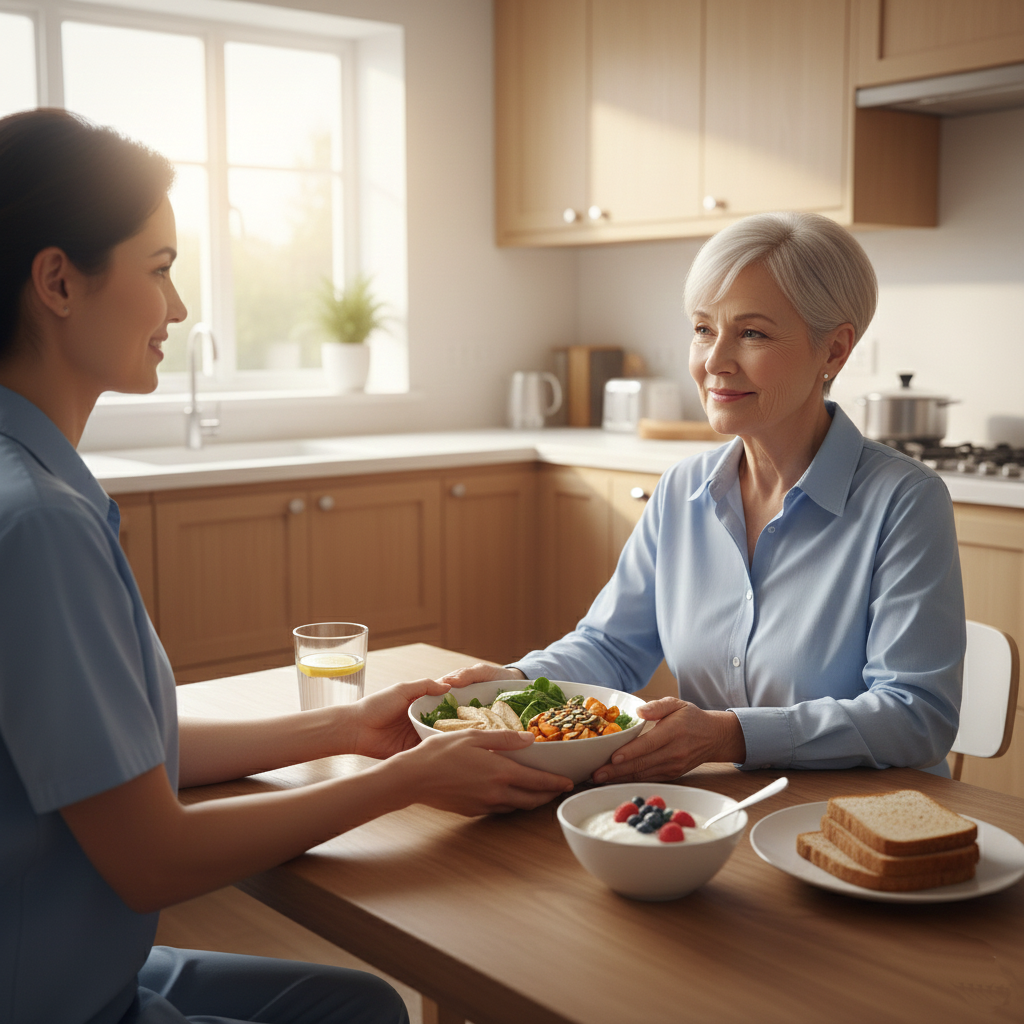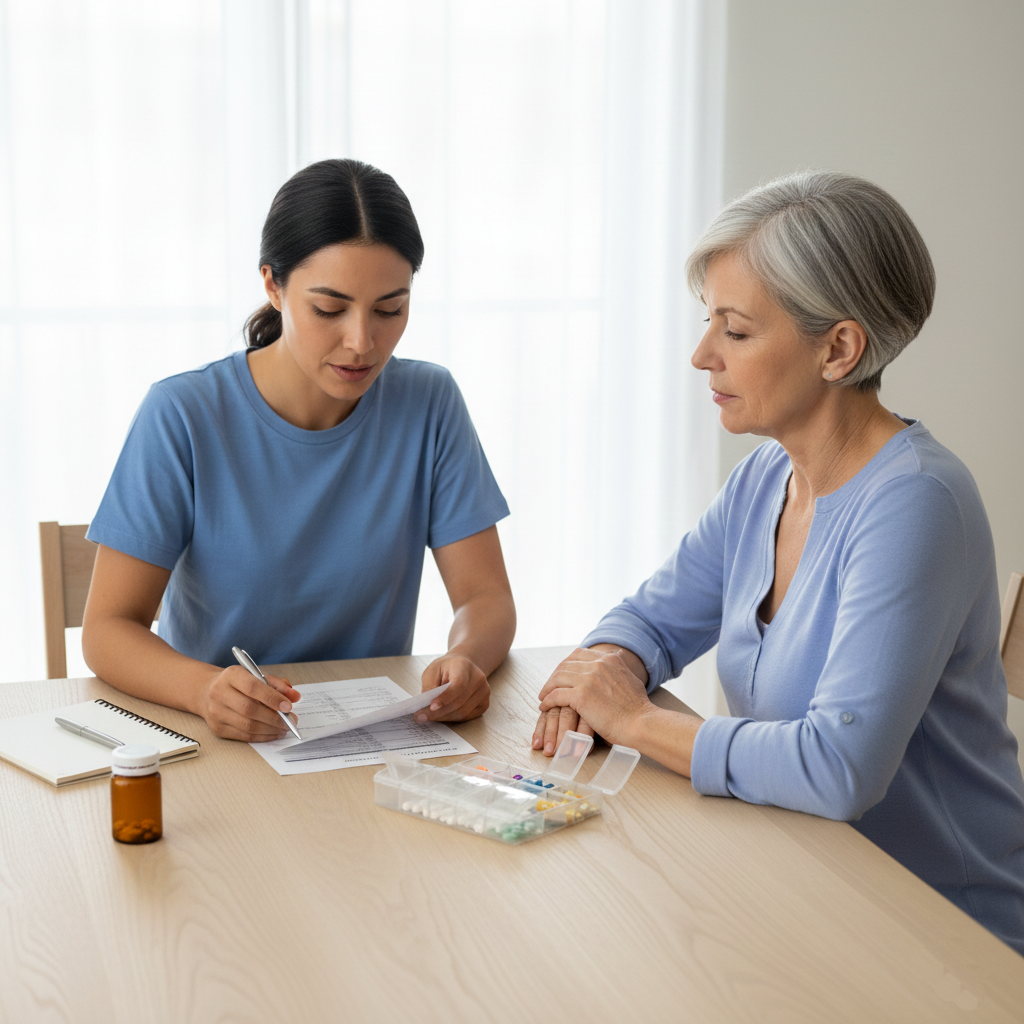Understanding Chemotherapy and Its Challenges
Chemotherapy is a systemic treatment that utilizes powerful medications to target and destroy cancer cells. This treatment is often pivotal in the management of various types of cancer, including breast, lung, colon, and blood cancers. It aims to eliminate cancerous cells either by directly killing them or by hindering their ability to multiply. Chemotherapy can be administered in different ways, such as intravenously, orally, or via injections, depending on the specific case and prescription from healthcare professionals. Caring for a cancer patient during chemotherapy and its challenges requires patience, empathy, and consistent support to help them manage physical side effects and emotional stress.
In this first part of the guide, we focus on understanding their emotional journey, communicating with empathy, and offering steady encouragement throughout treatment.
Common Physical Side Effects
Although chemotherapy can effectively manage cancer, it presents numerous challenges that patients could face during their treatment journey. Understanding these challenges is crucial for caregivers who provide support to their loved ones. One of the most apparent side effects of chemotherapy is fatigue, which can vary in severity and duration. Patients may experience a significant decrease in their energy levels, making daily activities feel insurmountable.

Emotional and Mental Challenges
In addition to physical impacts, chemotherapy also affects patients emotionally and psychologically. Fear, anxiety, and depression can be common emotional responses due to the uncertainty surrounding their diagnosis and treatment efficacy. Patients may grapple with feelings of isolation or helplessness, emphasizing the importance of emotional support from caregivers. Furthermore, individuals undergoing chemotherapy may endure challenges related to their appearance, such as hair loss, which can affect their self-esteem and body image significantly.
Why Caregiver Awareness Matters
Recognizing the array of side effects—ranging from nausea and vomiting to changes in taste and appetite—is essential for caregivers to empathize with and address their loved ones’ needs. Furthermore, becoming knowledgeable about the specific cancer type being treated and the corresponding chemotherapy regimen can facilitate better communication with health care providers, ultimately providing a framework for effective support. Navigating chemotherapy requires patience and understanding, and caregivers play a vital role in this challenging journey.
Emotional Support During Chemotherapy
Patients undergoing chemotherapy often face a multitude of emotional challenges that can overshadow their physical symptoms. Fear, anxiety, and uncertainty frequently emerge as they navigate the complexities of their treatment. As a caregiver, your role in providing emotional support is crucial, as it can significantly impact their mental well-being and coping mechanisms throughout this hard journey.
Practice Active Listening
Active listening is one of the most powerful forms of emotional support. Give your loved one your full attention, allow them to express their worries, and avoid interrupting.
Use simple prompts such as:
- “I’m here with you.”
- “Tell me how you’re feeling today.”

This creates a safe emotional space, reduces stress, and helps them feel heard and valued. Encouraging open communication allows patients to confront their emotions openly, which can help alleviate the mental strain they might feel.
Validate Feelings Gently
Avoid forcing optimism. Instead, acknowledge their feelings and reassure them that fear, sadness, and frustration are normal during cancer treatment. Small gestures can make a big difference — holding their hand, offering a warm smile, or sitting quietly beside them when words aren’t enough.
Tip: Phrases like “I understand this feels scary” and “It’s okay to feel tired today” show empathy without minimizing their emotions.
Encourage Hope & Positive Routine
Moreover, fostering a sense of hope and positivity is crucial. Help them focus on small victories, whether it’s completing a treatment cycle or experiencing a slight improvement on certain days. Engaging in activities that bring joy, such as watching movies together, reading, or enjoying nature, can elevate their mood and shift their focus from treatment to more positive experiences.
In this challenging time, being a reliable source of support demands understanding the unique emotional landscape of your loved one. Your role as a caregiver is to provide compassion and strength, remaining firm in your support while encouraging resilience in the face of adversity.
With the emotional aspect understood, let’s now look at physical care.
Managing Physical Side Effects at Home
Chemotherapy can introduce a range of physical side effects that may significantly impact a patient’s quality of life. Understanding these side effects and implementing appropriate care strategies is essential for caregivers to support their loved ones. Common side effects of chemotherapy include nausea, fatigue, hair loss, and changes in appetite. Caregivers can adopt various practical approaches to manage these symptoms effectively.
Handling Nausea & Vomiting
Nausea is a frequent concern during chemotherapy. Caregivers can assist by encouraging the consumption of small, frequent meals rather than large ones. Ginger tea or peppermint can be soothing; however, it is essential to consult with a healthcare provider to determine what is best for the individual’s condition. Keeping the kitchen stocked with bland, easy-to-digest foods can also prove beneficial in minimizing discomfort.

Fatigue & Energy Conservation
Fatigue often accompanies chemotherapy treatments. To help manage this symptom, establishing a daily routine that incorporates periods of rest and light activity can be beneficial. Encourage your loved one to listen to their body — some days will require rest, others may allow light activity. Balance is key. Additionally, creating a calm and comfortable environment can help promote relaxation during recovery periods.
Coping With Hair Loss
Hair loss can be a significant emotional side effect that affects self-esteem. Offering emotional support and discussing options such as wigs, hats, or scarves can help the patient cope with these changes. Providing a safe space for open dialogue about feelings can also be reassuring for the individual experiencing this change.
Appetite & Taste Changes
Changes in appetite are another common occurrence. Caregivers should emphasize the importance of appealing, nutritious meals. Maintaining open communication with healthcare providers is crucial, as they can offer personalized dietary suggestions and recommendations tailored to the patient’s specific needs and requirements. Adjusting to these changes can enhance overall well-being and help patients feel more comfortable during their challenging journey of chemotherapy.
Nutrition and Hydration Tips for Chemotherapy Patients
Providing appropriate nutrition and hydration is crucial for chemotherapy patients as they navigate treatment. Effective dietary choices can help manage common side effects, boost the immune system, and maintain energy levels throughout the process. Caregivers need to be informed about the kinds of foods that can be beneficial during this time.
Prioritizing Balanced, Nutritious Meals
First and foremost, it is important to focus on a balanced diet rich in vitamins, minerals, and antioxidants. Fresh fruits and vegetables are particularly valuable, as they provide essential nutrients that support the immune system. Incorporating a variety of colors ensures a wide spectrum of nutrients, with leafy greens such as spinach and kale offering high levels of folate, which may help counter the effects and challenges of chemotherapy.
Incorporating Immune-Supporting Foods
In addition to fruits and vegetables, caregivers should consider including protein-rich foods in the patient’s diet. Lean meats, fish, eggs, beans, and nuts can help repair tissues and maintain muscle mass, which is crucial when patients may experience weight loss or fatigue. Moreover, whole grains should be encouraged, as they provide complex carbohydrates that help sustain energy levels throughout the day.

Hydration Strategies That Actually Work
Hydration is another crucial aspect to consider. Chemotherapy can lead to dehydration, making it essential for caregivers to encourage fluid intake. Water is the best choice, but consider other options, such as herbal teas or broths, particularly when patients experience changes in taste or nausea. Small, frequent sips can make drinking easier. Ice chips or flavored water encourage hydration without overwhelming the patient.
Adapting Meals to Changing Taste Preferences
Lastly, being flexible with meal ideas and adapting to the patient’s preferences can help ensure they consume a sufficient amount of nutrients and fluids. Caregivers need to remain supportive, recognizing that some days may be more challenging than others; yet, a focus on nutrition and hydration can have a significant impact on the patient’s overall health and recovery.
Medication and Symptom Tracking
Managing medications and tracking symptoms during chemotherapy is crucial for the well-being of a loved one undergoing this challenging treatment. As a caregiver, it is your responsibility to help maintain an organized system that ensures medication adherence and accurate documentation of symptoms.
Creating a Medication Schedule
A structured medication schedule is one of the most effective tools to facilitate this process. Utilizing a pill organizer can simplify the administration of daily doses, while a digital app or a printed chart can provide reminders for each medication. This approach not only helps the patient stay on track but also alleviates potential stress associated with forgetting doses.
It is essential to understand the dosage instructions for each medication, including the frequency, timing, and whether it should be taken with food or water. Keep a printed version of these instructions nearby to reference whenever necessary.

Additionally, familiarize yourself with any potential side effects that may occur. Awareness of the medications involved will empower you to closely monitor the loved one’s condition and promptly address any concerns with healthcare providers.
Tools to Track Symptoms Daily
Incorporating symptom tracking into your routine is equally important. Documenting daily changes in physical and emotional health can provide valuable insights into how well the treatment is tolerated. This can include noting any nausea, fatigue, pain levels, and changes in mood. A journal or digital spreadsheet may serve as an effective method to log these symptoms consistently.
Communicating Updates With Healthcare Providers
Sharing this information with healthcare providers during appointments enables them to adjust care plans as needed, ensuring the patient receives the most appropriate support throughout their treatment.
Effective communication about medications and symptoms allows caregivers to advocate for their loved ones, ultimately enhancing the care experience during chemotherapy. Prioritizing these two aspects can lead to improved health outcomes and a better quality of life throughout the challenging chemotherapy journey.
You’re already making a difference. Ready to learn how to create a supportive home environment, , and long-term adjustment during chemo?
👉 Continue to Part 2: Caring for a Loved One During Chemotherapy — Part 2 >>





